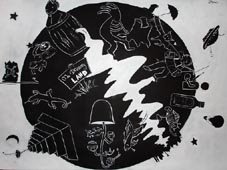my only conceptual art-work
 Conceptual art is art in which the concept(s) or idea(s) involved in the work take precedence over traditional aesthetic and material concerns...
Conceptual art is art in which the concept(s) or idea(s) involved in the work take precedence over traditional aesthetic and material concerns...The French artist Marcel Duchamp paved the way for the conceptualists, providing them with examples of prototypically conceptual works -- the readymades, for instance (for example).
Conceptual art emerged as a movement during the 1960s. In part, it was a reaction against formalism as it was then articulated by the influential New York art critic Clement Greenberg. In 1961 the term "concept art," coined by the artist Henry Flynt in his article bearing the term as its title, appeared in a Fluxus publication... if you want to know much more about the article click here to reach a wikipedia site about conceptual art.
If you remember I already spoke about this work - if not click here to visit the older post.

...so the letter made it - Avignon - Tokyo - Sarajevo - Tokyo and again back to Avignon; but there were nobody any more so the work get s a little souvenir like you can see on the photo below (COURRIER REEXPEDIE), finally I get the letter back and now it is on his next journey with more informations in it to Germany... (see the photo below) -

...hmm hope it will reach his goal, if so than it will travel a little bit around Germany before it continues if "survivre" (hehehe) his way around the world - next land is Sweeden I guess.

...hmm hope it will reach his goal, if so than it will travel a little bit around Germany before it continues if "survivre" (hehehe) his way around the world - next land is Sweeden I guess.
Wee will see.










